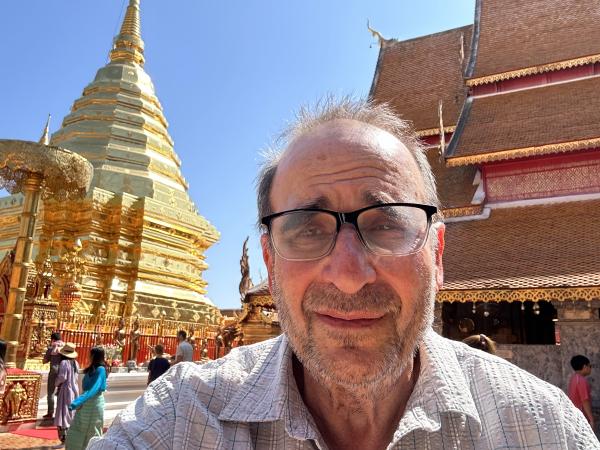Percolation in an antagonistic model of two-species random sequential adsorption
Robert Ziff, University of Michigan, Chemical Engineering
There will be coffee and snacks.
Abstract: An important paradigm in non-equilibrium physics is the Random Sequential Adsorption (RSA) problem, where objects adsorb on a surface randomly and one at at time, with the rule that if another object is there already such that an overlap would occur, the attempted adsorption is rejected. This leads to an ever-slowing filling of the surface until a saturated or jammed state is reached. Some early examples of this process are the lattice dimer model of Paul Flory, which modeled attachment of pendant groups on a polymer chain, and the car-parking problem of Alfréd Rényi, which describes segments randomly added to a line. Both of these problems are one-dimensional and were solved exactly. In higher dimensions, results require the use of computer simulation, though important results about the asymptotic time behavior have been predicted. In this talk we describe a two-dimensional system of two types of particles, A and B, which occupy only a single site on a lattice but have the restriction that the opposite species cannot be nearest neighbors of each other. Again a saturated configuration is reached. At a critical value of the relative adsorption rate of A particles, the A particles in this saturated configuration form large fractal clusters that percolate throughout the system. Here we discuss various ways to study that percolation transition, which is shown to be in the universality class of ordinary percolation. There are three states of the lattice sites: A, B, and blocked (X), and it is shown how the X sites create closed boundaries around the clusters if diagonal connections (the matching lattice) are used. Other related problems are also discussed.
This seminar will be recorded for viewing after the talk.
Abstract: An important paradigm in non-equilibrium physics is the Random Sequential Adsorption (RSA) problem, where objects adsorb on a surface randomly and one at at time, with the rule that if another object is there already such that an overlap would occur, the attempted adsorption is rejected. This leads to an ever-slowing filling of the surface until a saturated or jammed state is reached. Some early examples of this process are the lattice dimer model of Paul Flory, which modeled attachment of pendant groups on a polymer chain, and the car-parking problem of Alfréd Rényi, which describes segments randomly added to a line. Both of these problems are one-dimensional and were solved exactly. In higher dimensions, results require the use of computer simulation, though important results about the asymptotic time behavior have been predicted. In this talk we describe a two-dimensional system of two types of particles, A and B, which occupy only a single site on a lattice but have the restriction that the opposite species cannot be nearest neighbors of each other. Again a saturated configuration is reached. At a critical value of the relative adsorption rate of A particles, the A particles in this saturated configuration form large fractal clusters that percolate throughout the system. Here we discuss various ways to study that percolation transition, which is shown to be in the universality class of ordinary percolation. There are three states of the lattice sites: A, B, and blocked (X), and it is shown how the X sites create closed boundaries around the clusters if diagonal connections (the matching lattice) are used. Other related problems are also discussed.
This seminar will be recorded for viewing after the talk.
| Building: | Weiser Hall |
|---|---|
| Website: | |
| Event Type: | Workshop / Seminar |
| Tags: | chemical engineering, Natural Sciences, Non-equilibrium Physics, Physics, Research |
| Source: | Happening @ Michigan from The Center for the Study of Complex Systems, The College of Literature, Science, and the Arts, Department of Physics, Chemical Engineering |


